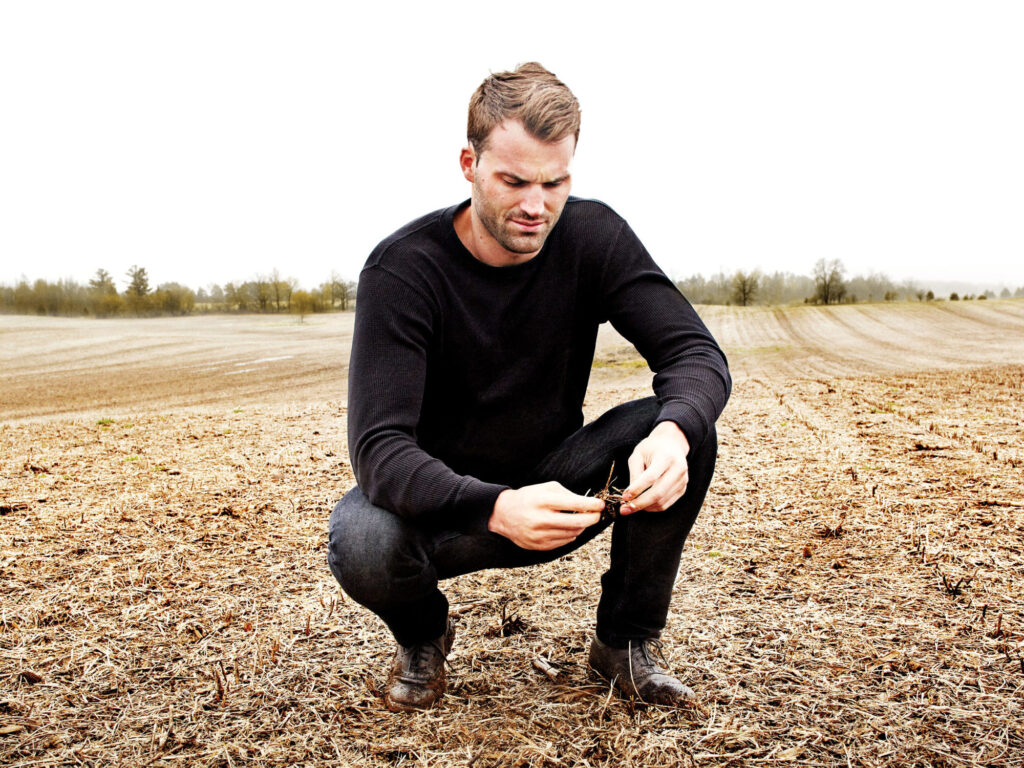Advertisement
After the NFL, Tackling Plant-Based Protein
One player’s commitment to clean eating leads to a new career

 Tyler Lorenzen was about eight years old when his dad saw him sipping a soda one day and told him that drinking pop would make him slow.
Tyler Lorenzen was about eight years old when his dad saw him sipping a soda one day and told him that drinking pop would make him slow.
“I said, ‘Well, I want to be fast,’” Lorenzen says. “And from then on, I’ve had a nutrition-forward outlook on how I feed my body.”
The commitment paid off: Lorenzen went on to quarterback the University of Connecticut football team, and eventually signed with the New Orleans Saints as a tight end. The team won the Super Bowl during his rookie season in 2009; while Lorenzen didn’t see action on the field, the experience helped shape his career in the family business: peas.
Advertisement
‘Make moves or get moved’
“I might not have been able to become a world-class name on the field, but what I learned from a team about going to the pinnacle, how leaders lead, how people step up and that it’s always about putting the team first—that ultimately makes everything worthwhile,” says the 31-year-old, sitting at the conference table at the headquarters of PURIS, formerly World Food Processing, a non-GMO seed, grain and ingredient company that he now helms as president. His dad, Jerry Lorenzen, continues to serve as CEO from the company’s Iowa office.
Moving from the NFL to organic food production may not be a typical career path, but Lorenzen embraced the change. Lorenzen knew he’d have “a tough row to hoe” to continue in the NFL when the Saints nabbed Jimmy Graham, who Lorenzen predicted would be one of the best tight ends in the NFL, in 2010. So after the 2011 training camp, when Lorenzen was released by the Saints in the final cut, he moved back to Iowa and told his family he was done with football.
“You’ve got to make moves or get moved,” Lorenzen said at the time. “It was a really fun snapshot in life, but sports are finite. My dad always told me that in sports, you work your whole life on the only thing you know, and the next day it’s going to be gone.”
So when he learned that his dad had the opportunity to make plant-based proteins, he knew it was time to make a move.
“I said if we went for it, I was in 100 percent,” he says—a surprise to his dad.
Lorenzen had never lost his passion for clean eating. When he was told to bulk up for the NFL, he ignored the advice of teammates to eat more calorie-laden junk food, sticking to a nutrition philosophy that he now calls “plant-strong-tarian.” This meant striving to get the bulk of his calories from plants, even when he was eating 6,000 calories a day.
Advertisement
Why pea protein?
Lorenzen and research developer Kushal Chandak started developing a protein out of soy, but they quickly realized that soy was not “Google friendly” enough to sell well. Lorenzen remembered that back before college, he and his dad were walking through the field one day when he noticed some peas. Jerry Lorenzen was convinced that peas would play a big role in the future of organic farming, in part because they add nutrients to the soil and can be used as cover crops.
Could you make protein from peas? Because peas contain all essential amino acids, Chandak knew it was possible. The question, though, came down to taste.
“Jerry always told me if the product doesn’t taste good, we’re never gonna sell it,” Chandak says.
But there was no guarantee a pea protein would taste good. Both Lorenzen and Chandak guffaw with laughter at the idea that they were confident they could nail the taste. No, they were not at all confident, they say, high-fiving each other at the memory. So, they were surprised when they tasted an early prototype and realized it had a better flavor than their soy protein. They brought a sample to a skeptical Jerry Lorenzen, who tasted it and declared, “You guys have got something here.”
Advertisement
Fast-forward five years
You can now find PURIS ingredients in everything from energy bars to dairy-free milks to sport protein powders. Because of the relatively high amylose content in pea starch, the body digests it more slowly than most starches, which can help keep the body’s glycemic index low. The PURIS development lab is constantly tinkering with recipes featuring their proteins: oatmeal, snack puffs, peanut butter chocolate cereal with plant-based milk.
When Lorenzen is joking with co-workers, his effervescence infusing the office with an entrepreneurial spirit, it’s easy to see the intersection between sports and business. It doesn’t seem like such a far cry from the days when he and his high school football teammates worked in his family’s cornfields in the summer or harvested the corn in the fall, followed by a pizza party.
His personal mantra, Make Moves or Get Moved, has become something of a company mantra, where employees refer to it as MMOGM.
“We want to continue to push the future of plant-based nutrition,” Lorenzen says. In the end, he believes products that are the least expensive to produce, the best tasting and the most sustainable will win.
PHOTOS by Bill Phelps




